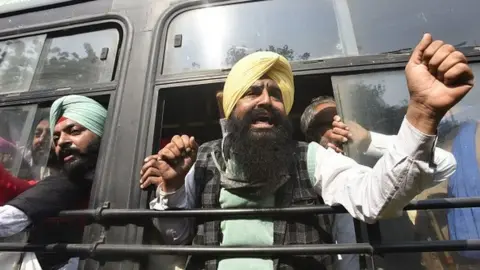Farm laws: Why India PM Narendra Modi rolled back vexed reforms

 EPA
EPAIndian Prime Minister Narendra Modi's decision to repeal the contentious farm laws is, at once, a strategic and political move and a belated admission of its haste, high-handedness and lack of legislative acumen.
The laws aimed at deregulating the market had whipped up an unprecedented firestorm of protest in the states of Punjab and Uttar Pradesh and posed a real challenge to Mr Modi. They had mobilised farmers and civil society in Sikh-majority Punjab and spread quickly to parts of Uttar Pradesh, states which will see key elections early next year. Taken aback, Mr Modi's government had called protesters names and stubbornly stuck to its position.
The BJP, which had not anticipated such a blowback, has been trying hard to placate the Sikhs. Much of its executive meeting earlier this month was devoted to assuaging the community's sentiments: increasing farm budget and crop prices, re-opening a historic corridor to one of Sikhism's holiest shrines in Pakistan, a fresh probe to punish the guilty in the 1984 anti-Sikh riots in Delhi.
Also, the government was clearly getting jittery about the growing alienation of the Sikh community over the laws.
History holds grim lessons in Punjab, a strategic border state: a violent separatist movement in the 1980s was fuelled by similar estrangement of the community. There were warnings from the party faithful: The Sikhs "should not be bothered," Satyapal Malik, a former BJP vice president and present governor of Meghalaya state, said in October, adding that the community has risen against the government and even powerful empires in the past.
By repealing the laws, Mr Modi hopes to regain the confidence of the farmers in general and Sikhs in particular.
 Getty Images
Getty ImagesThe jury is out on whether it will boost his party's chances in the upcoming state polls. Things have not been going well: prices are rising, joblessness is rife, an already-faltering economy is trying to claw out of the pandemic slowdown. Farmers have been angry and, in Uttar Pradesh, BJP's own leaders have been accused of violence against farmers. In Punjab, party leaders have been facing fierce protests on campaign trails for local polls.
"When things are not going in your favour, you make a move in order to deny advantage to your opponents from the emerging situation. The move to repeal the farm laws aims at doing that in many ways," Rahul Verma, a fellow with the Delhi-based Centre for Policy Research think tank, told me.
Many doubt that the move will benefit BJP much in the elections. In Punjab, the BJP can expect minor gains, if at all. In western Uttar Pradesh - which elects 60 to 80 of the 403 legislators in the state assembly - the party might reap some benefits. By arresting a possible slide in seats in Uttar Pradesh, the BJP will hope to win the bellwether state "comfortably" and contest the 2024 general election on a strong footing.
As far as the farm laws are concerned, the repeal reveals the BJP's lack of legislative acumen. Much of Mr Modi's supposedly bold reforms that were bulldozed through the parliament are stuck: his government has failed to implement a land acquisition law; the rules of new labour laws and a controversial citizenship laws have been delayed. A large part of this blame must lie with the party's failure to engage with the opposition in parliament and rushing legislation.
In the short run, Mr Modi's supporters are likely to feel let down by a leader they perceive as bold and decisive. The opposition will feel emboldened. The aura of invincibility built around Mr Modi's leadership also suffers a dent; what is clear is that mass protests can still unnerve a government which rules with a brute majority in Delhi and faces little resistance from an enfeebled opposition. Mr Modi is adroit in changing the narrative in his favour, so his political communication on the rollback in the days ahead will be keenly heard.
As for those who had supported the farm reforms, it is again a salutary lesson that good economics often makes for poor politics. Especially when there is a trust deficit between the key stakeholders and the government; and the politics is partisan and non-consultative.
